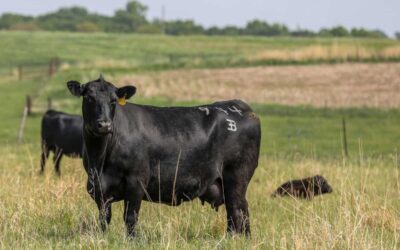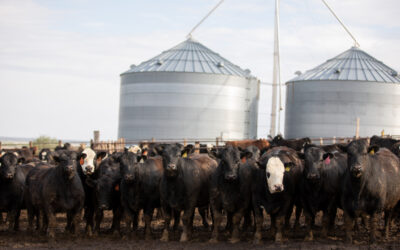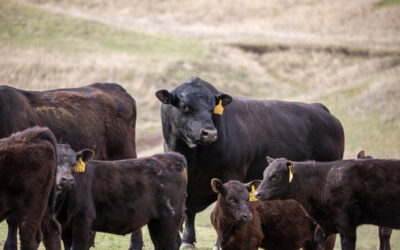
Colvin Fund: $40,000 for 7 young leaders
by Hanna Johlman
Seven college students in beef and related studies have been awarded $40,000 in scholarships from the Certified Angus Beef ® (CAB®) brand. That’s up nearly 54% from last year’s total.
Established in 1999, the Colvin Scholarship Fund supports education of future leaders in agriculture and animal sciences and honors the brand’s founding executive director of 21 years, Louis M. “Mick” Colvin. The program carries on his legacy of making dreams a reality and inspiring others to do their best.
2017 Colvin Scholarship Awards:
$7,500 – Sierra Jepsen, Amanda, Ohio – The Ohio State University
$6,500 – Terrel Platt, Pilot Rock, Ore. – Colorado State University
$5,000 – Chandler Steele, Midland, Mich. – Oklahoma State University
$4,000 – Austin Wenck, East Troy, Wis. – University of Wisconsin-Madison
$3,000 – Elisabeth Loseke, Columbus, Neb. – University of Nebraska-Lincoln





Graduate Awards:
$7,500 – Lauren Eastwood, New Braunfels, Texas – Texas A&M University
$6,500 – Andrea English, Lubbock, Texas – Texas Tech University


In a future with even heavier beef carcasses, undergraduate essays explored what the CAB brand can do to keep beef competitively priced while delivering the high-quality product so much in demand.
Top award winner Sierra Jepsen, senior in agribusiness and applied economics at The Ohio State University, stands out as the only repeat Colvin winner – not just twice but three times, including second place last year. She said quality and marbling will always be the highest “dollarization factor” for beef.
“It is a simple correlation that, if a producer can increase marbling in beef more quickly, those cattle can be sent to market at a younger age; thus, a more moderate carcass weight,” Jepsen wrote.
She noted several studies suggest selection for marbling and docility, proper feeding and knowing when to harvest cattle can all lead to higher quality grades sooner. Granted, fewer pounds go against market rewards, but Jepsen argued CAB can partially offset that through education across all sectors of the production chain.
Terrel Platt, senior in animal science and agribusiness at Colorado State University, won second-high honors with an essay about inconsistency from the heavier weights. The Oregon native wrote that the brand could further restrict ribeye size to those from 12 to 16 square inches and encourage greater sorting of cuts for boxed beef for unmatched consistency.
Animal science senior Chandler Steele, Oklahoma State University, wrote that CAB will remain synonymous with quality, that brand loyalty accumulated over 38 years will endure, no matter how drastically the market changes. She noted genetic change can only add so many pounds before it becomes non-functional to the animals carrying the weight, and that demand from the foodservice sector will increase if a beef supply for their needed specifications should diminish.
Winner of the $4,000 award, Austin Wenck of the University of Wisconsin-Madison, wrote that CAB is both the mediator and idea coordinator between farms and consumers, a unique position that allows for credibility with producers. At the same time, the brand can lead research efforts such as those at Texas Tech University that found a cellular-level protein receptor linked to marbling.
University of Nebraska animal science and pre-veterinary senior Elisabeth Loseke wrote that she has seen how niche marketing opened producers to creative ways to stay competitive, and the CAB brand leads those categories. Perhaps a return to the 1,000-pound carcass weight limit could initiate a downward trend in frame size, she suggested, noting producers have proven interest in qualifying for the brand and will work to fit breeding programs to the standard.
The Colvin Scholarship Fund began its graduate student awards in 2012, opening doors to anyone in a recognized, full-time masters or doctorate program related to high-quality beef production.
Lauren Eastwood’s research demonstrates her interest in ensuring consumers get quality beef products. The top graduate-award winner and animal science Ph.D. candidate at Texas A&M University examined “Possible quality defects in beef caused by multiple applications of antimicrobial interventions.”
She wrote, “Overall, findings from this study support that these food safety inventions, while effective in reducing microbiological counts on product surfaces, do not negatively impact beef quality.”
After completing her doctorate this fall, Eastwood plans a career that bridges the U.S. and international meat and livestock markets.
Second-high award winner, Andrea English seeks her Ph.D. in animal and food science at Texas Tech University. Her work in meat science and food safety explores “Alternatives to sub-therapeutic antibiotics in beef cattle feeding to improve performance and mitigate emergence of antimicrobial drug resistance.”
English said her research “provides an alternative to those antibiotics… that can maintain performance of the cattle while also reducing the emergence of antimicrobial-resistant pathogens” that could enter the food supply.
As the top scholarship recipients, Jepsen and Eastwood receive all-expense-paid trips to the 2017 CAB Annual Conference, Nashville, Tenn., September 27-29. There, they will interact with leaders in beef production, packaging, retail and foodservice.
Launched in 1978 and owned by 25,000 American Angus Association members, CAB is the largest brand of fresh beef in the world. Fiscal year 2016 set a record of more than 1 billion pounds sold through its 18,000 partners in 50 countries. Learn more about the brand at www.certifiedangusbeef.com, or access producer resources at www.cabpartners.com.
You may also like
Promising Quality in Angus
Before Certified Angus Beef, consumers didn’t know what “Angus” meant. Angus meant little, except to its breeders. A strict adherence to quality through its 10 carcass specifications continues to serve as the foundation for maintaining the breed’s premium beef position in the marketplace and drives demand for registered Angus genetics.
The Angus Argument
There’s no denying CAB has helped dramatically expand the market share for registered Angus genetics. Arguably, that success has encouraged several other breeds to adopt a black hide color by incorporating registered Angus genetics into their breeding programs and registries.
From Decline to Dominance
Initiated from a simple yet visionary idea, and pursued through the grit and tenacity of Angus breeders seeking a better future for the breed and Association members, it’s no accident that Certified Angus Beef is where it is today.



